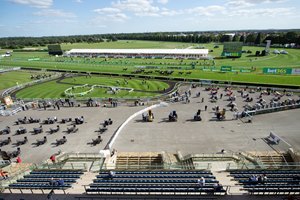Johnson Confirms Continued Sports COVID-19 Restrictions


British racing was left reeling Sept. 22 following the devastating news that crowds are unlikely to return for six months—something one of the industry's most senior figures said "threatens the survival of sports organizations and the many livelihoods they support."
The impact of the COVID-19 pandemic has already had a huge impact on the sport, which has taken place behind closed doors since its resumption in June, although it was hoped spectators would be able to return from Oct. 1.
However, that optimism disappeared when prime minister Boris Johnson, speaking in the House of Commons, announced the restrictions in a bid to curb transmission of the disease, including the banning of crowds at planned sports pilots such as Newmarket's three-day Cambridgeshire meeting this week.
"We will spare no effort in developing vaccines, treatments, and new forms of mass testing but unless we palpably make progress we should assume the restrictions I've announced will remain in place for perhaps six months," Johnson said.
"If things turn around and the British public can do what they did before to get this virus under control then, of course, we will review the measures."

Those words were described as "serious blow to the horseracing industry and to the people and communities who depend upon it for their living" by the British Horseracing Authority, Horsemen's Group, and Racecourse Association, which added in a statement: "We have told the UK government our racecourses were facing a loss of £250 to £300 million of revenues this year, which in turn means less prize-money flowing through to our participants and our owners."
Johnson's measures—which he expects to be enforced by the devolved powers in Wales and Scotland—raise the possibility of the Cheltenham Festival, the jewel in the crown of Jockey Club Racecourses, which owns 14 other tracks, going ahead with no crowd in March.
Doncaster hosted a trial for racegoers this month and Warwick, another Jockey Club venue, opened its doors to a limited number of people Monday, but the fact the paying public could be absent for what would in effect be 12 months dating back to lockdown in the spring has resulted in calls for government intervention.
Nevin Truesdale, group chief executive of the British Jockey Club, said: "The two pilot events staged by racing showed that we can host people safely with so much outdoor space for social distancing and stringent protocols in place. Nevertheless, we respect the government's decision to pause their pilot program across sport as part of trying to reduce contact between people.
"Without paying spectators, the largest revenue streams for many sports have been cut off for six months to date and, with no prospect of a change soon, this threatens the survival of sports organizations and the many livelihoods they support.
"Now is the time that sport needs the government to step in and provide direct support to the industry, as it did when awarding £1.57 billion to the arts in July. Sport and physical activity sustains 600,000 jobs and contributes more than £16 billion per year to the UK economy. British racing alone contributes more than £4 billion a year in normal times, which clearly these are not."
Around six million people attend race meetings each year in Britain, making it the second-largest spectator sport. Their return is likely to have been near the top of Nick Rust's agenda when the outgoing BHA chief executive was involved in an urgent meeting with Oliver Dowden, the secretary of state for the Department for Digital, Culture, Media, and Sport, on Tuesday afternoon that was set to include discussions of a recovery fund.
Rust may also have taken the opportunity to lobby for a change in the way racing is funded. He said: "Racing's leaders are responding to this crisis by working together like never before. We are working to a recovery plan, but today's announcement will set back our progress. We will urge the government to provide financial support, as they have indicated they are considering, and to accept the case for urgent reform of the levy.
"Our loyal owners and our key international investors have stood by us and we ask government to work with us to maintain that confidence in racing and in Britain."
Racing in Britain restarted June 1 at Newcastle under strict guidelines, which were eased when owners were allowed to attend a month later, although a setback came in August when Goodwood had to cancel a test event at its Glorious fixture following a spike in COVID-19 cases.
The Sussex circuit's managing director Adam Waterworth laid bare the implications of the pandemic on the BBC's Today Programme on Radio 4.
"Oct. 11 was due to be our final meeting of the season and we were planning to allow a small crowd in, probably in hope rather than expectation in the last few weeks," he said.
"With this news it means the entire flat season will have been and gone with no people whatsoever. We're in the events business and there's no business without people. It's going to be difficult.
"I wouldn't want to underplay what's been done already but an extension of the rates relief and furlough schemes would help us to keep people on the books and try our best to ride this through."
